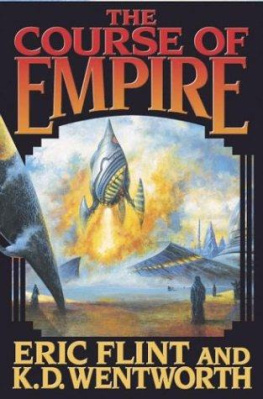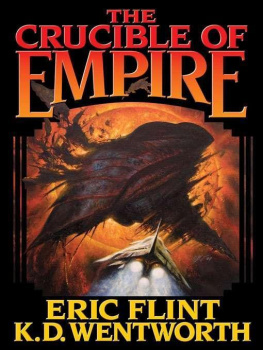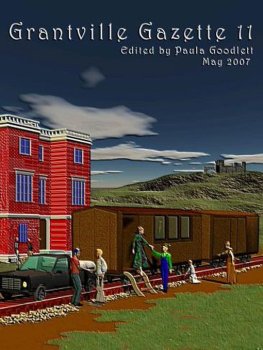Eric Flint - Grantville Gazette.Volume 22
Here you can read online Eric Flint - Grantville Gazette.Volume 22 full text of the book (entire story) in english for free. Download pdf and epub, get meaning, cover and reviews about this ebook. genre: Science fiction. Description of the work, (preface) as well as reviews are available. Best literature library LitArk.com created for fans of good reading and offers a wide selection of genres:
Romance novel
Science fiction
Adventure
Detective
Science
History
Home and family
Prose
Art
Politics
Computer
Non-fiction
Religion
Business
Children
Humor
Choose a favorite category and find really read worthwhile books. Enjoy immersion in the world of imagination, feel the emotions of the characters or learn something new for yourself, make an fascinating discovery.

- Book:Grantville Gazette.Volume 22
- Author:
- Genre:
- Rating:5 / 5
- Favourites:Add to favourites
- Your mark:
- 100
- 1
- 2
- 3
- 4
- 5
Grantville Gazette.Volume 22: summary, description and annotation
We offer to read an annotation, description, summary or preface (depends on what the author of the book "Grantville Gazette.Volume 22" wrote himself). If you haven't found the necessary information about the book — write in the comments, we will try to find it.
Grantville Gazette.Volume 22 — read online for free the complete book (whole text) full work
Below is the text of the book, divided by pages. System saving the place of the last page read, allows you to conveniently read the book "Grantville Gazette.Volume 22" online for free, without having to search again every time where you left off. Put a bookmark, and you can go to the page where you finished reading at any time.
Font size:
Interval:
Bookmark:
Eric Flint
Grantville Gazette.Volume 22
What is this? About the Grantville Gazette
Written by Grantville Gazette Staff
The Grantville Gazette originated as a by-product of the ongoing and very active discussions which take place concerning the 1632 universe Eric Flint created in the novels 1632, 1633 and 1634: The Galileo Affair (the latter two books co-authored by David Weber and Andrew Dennis, respectively). This discussion is centered in three of the conferences in Baen's Bar, the discussion area of Baen Books' web site. The conferences are entitled "1632 Slush," "1632 Slush Comments" and "1632 Tech Manual." They have been in operation for almost seven years now, during which time nearly two hundred thousand posts have been made by hundreds of participants.
Soon enough, the discussion began generating so-called "fanfic," stories written in the setting by fans of the series. A number of those were good enough to be published professionally. And, indeed, a number of them were-as part of the anthology Ring of Fire, which was published by Baen Books in January, 2004. (Ring of Fire also includes stories written by established authors such as Eric Flint himself, as well as David Weber, Mercedes Lackey, Dave Freer, K.D. Wentworth and S.L. Viehl.)
The decision to publish the Ring of Fire anthology triggered the writing of still more fanfic, even after submissions to the anthology were closed. Ring of Fire has been selling quite well since it came out, and a second anthology similar to it was published late in 2007. Another, Ring of Fire III, is forthcoming. It will also contain stories written by new writers, as well as professionals. But, in the meantime the fanfic kept getting written, and people kept nudging Eric-well, pestering Eric-to give them feedback on their stories.
Hence the Grantville Gazette. Once he realized how many stories were being written-a number of them of publishable quality-he raised with Jim Baen the idea of producing an online magazine which would pay for fiction and nonfiction articles set in the 1632 universe and would be sold through Baen Books' Webscriptions service. Jim was willing to try it, to see what happened.
As it turned out, the first issue of the electronic magazine sold well enough to make continuing the magazine a financially self-sustaining operation. Since then, even more volumes have been electronically published through the Baen Webscriptions site. As well, Grantville Gazette, Volume One was published in paperback in November of 2004. That has since been followed by hardcover editions of Grantville Gazette, Volumes Two, Three and Four.
Then, two big steps:
First: The magazine had been paying semi-pro rates for the electronic edition, increasing to pro rates upon transition to paper, but one of Eric's goals had long been to increase payments to the authors. Grantville Gazette, Volume Eleven is the first volume to pay the authors professional rates.
Second: This on-line version you're reading. The site here at http://www. grantvillegazette. com is the electronic version of an ARC, an advance readers copy where you can read the issues as we assemble them. There are stories posted here which won't be coming out in the magazine for more than a year.
How will it work out? Will we be able to continue at this rate? Well, we don't know. That's up to the readers. But we'll be here, continuing the saga, the soap opera, the drama and the comedy just as long as people are willing to read them.
The Grantville Gazette Staff
The Anaconda Project-Next Episode
Written by Eric Flint
Eric Flint prefers to write two chapters at a time, so we'll be offering that in every other issue, starting with Grantville Gazette, Volume 23. Unless something changes, of course.
Arsenic and Old Italians
Iver P. Cooper
The liquid in the shallow dish ignited, releasing a burst of yellow-green fire. The audience, a curious mix of Tuscan scholars and glitterati, applauded.
Lewis Philip Bartolli acknowledged the applause with a briefly lifted hand. "This lovely green reveals the presence of the element boron, which was not known to the ancients. The liquid is distilled spirits, which burn nicely. To the spirits, I added what chemists call boric acid. This boric acid contains one atom of boron, three of oxygen, and three of hydrogen, and it was obtained from the volcanic emissions of the Maremma of southern Tuscany."
A servant in the livery of the reigning Grand Duke of Tuscany, Ferdinand de Medici, silently glided down the aisle, and whispered into the ear of Andrea di Giovanni Battista Cioli, the Tuscan Secretary of State. Cioli flinched, then muttered something to his companion, the teenaged Prince Leopold.
"The green color of the flame is the result of the excitation of the electrons of boron. Next, I would like to show you-"
Cioli rose abruptly. "On behalf of the Serenissime Grand Duke, of His Highness don Leopoldo, the learned fellows of the Academy, our guests, and myself, I would like to thank Dottore Bartolli for a fascinating presentation on chemistry. Unfortunately, we must excuse him, as he has a pressing engagement."
I do? But Lewis kept this thought to himself, and bowed.
The crowd filed out. The increased hubbub woke up Galileo Galilei, who was snoring away in a front seat. Like Lewis, the great man was expected to entertain the court. Lewis gave chemistry demonstrations during the day, and Galileo set up his telescope and explained the wonders of the night sky. Since he was up half the night, and was more than twice Lewis' age, it was perhaps understandable that he couldn't always stay awake for Lewis' lecture.
"Um, what. Oh. Wonderful presentation, Lewis. Another nail in the coffin of the Aristotelians."
Cioli put his arm around Lewis. "Walk with me, dear chemist. You can take my coach to your pressing engagement." He turned to Leopold. "Your Highness, you are welcome to join us, I think you will find the matter of interest." Leopold was the grand duke's youngest brother.
In the privacy of the coach, Lewis finally could speak his mind. "For Christ's sake, what is this all about?"
"Grand Duke Ferdinando was dining with one of his leading noblemen. The man suddenly showed signs of severe gastric distress."
"I am not a physician-"
"You don't need to be; he is already dead."
"And you suspect-"
"Murder. Yes. By poison, we think. So we need your expertise."
Prince Leopold chimed in. "Surely your mentor, the great Sherlock Holmes, would expect you to assist us."
The grand duke and his brothers had not initially grasped the concept that the Sherlock Holmes Lewis had told them about was a fictional character, and Lewis' business associate in Tuscany, Niccolo Cavriani, had warned Lewis not to correct them. "In general, it is not a good idea to tell a ruler that he is wrong. Especially when the error is a harmless one" were his words. Hence, earlier that year, Lewis had not protested when Grand Duke Ferdinand proclaimed the young up-timer to be "Consulting Detective to the Grand Duchy of Tuscany."
They rode in silence for a few minutes.
Cioli cleared his throat. "During your investigation, Lewis, please keep in mind that the deceased lord might not have been the real target of the poisoner. The grand duke is not popular in all circles of power in Tuscany. Or beyond. Especially since he has shown favor to you, and thus, however obliquely, to your United States of Europe."
"So you think it was an assassination attempt gone amiss?"
Cioli shrugged. "Who can say? But you see that the investigation is of the greatest importance. You doubtless will be rewarded appropriately for proving the identity the poisoner." Cioli was too polite to mention the consequences of failure.
Or perhaps he thought it more effective to leave them to Lewis' imagination.
Font size:
Interval:
Bookmark:
Similar books «Grantville Gazette.Volume 22»
Look at similar books to Grantville Gazette.Volume 22. We have selected literature similar in name and meaning in the hope of providing readers with more options to find new, interesting, not yet read works.
Discussion, reviews of the book Grantville Gazette.Volume 22 and just readers' own opinions. Leave your comments, write what you think about the work, its meaning or the main characters. Specify what exactly you liked and what you didn't like, and why you think so.







